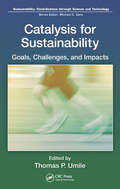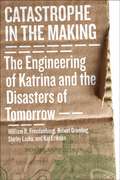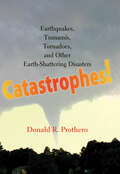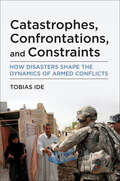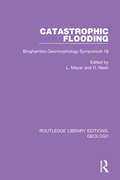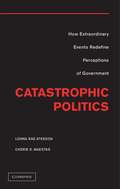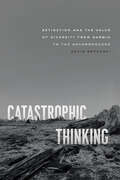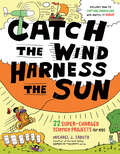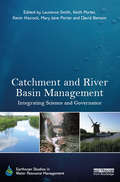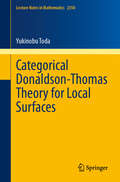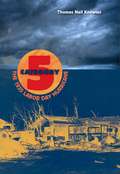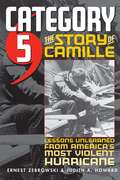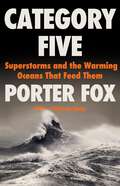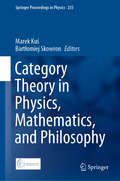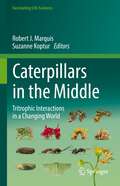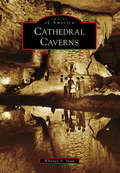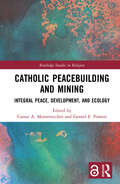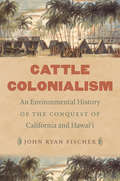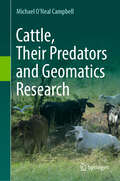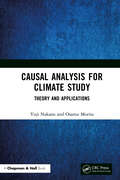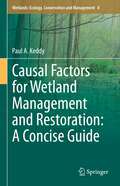- Table View
- List View
Catalysis for Sustainability: Goals, Challenges, and Impacts (ISSN)
by Thomas P. UmileCatalysis for Sustainability: Goals, Challenges, and Impacts explores the intersection between catalytic science and sustainable technologies as a means to addressing current economic, social, and environmental problems. These problems include harnessing alternative energy sources, pollution prevention and remediation, and the manufacturing of comm
Catastrophe in the Making: The Engineering of Katrina and the Disasters of Tomorrow
by Shirley Laska William R. Freudenburg Robert B. Gramling Kai EriksonWhen houses are flattened, towns submerged, and people stranded without electricity or even food, we attribute the suffering to "natural disasters" or "acts of God." But what if they're neither? What if we, as a society, are bringing these catastrophes on ourselves? That's the provocative theory of Catastrophe in the Making, the first book to recognize Hurricane Katrina not as a "perfect storm," but a tragedy of our own making--and one that could become commonplace. The authors, one a longtime New Orleans resident, argue that breached levees and sloppy emergency response are just the most obvious examples of government failure. The true problem is more deeply rooted and insidious, and stretches far beyond the Gulf Coast. Based on the false promise of widespread prosperity, communities across the U.S. have embraced all brands of "economic development" at all costs. In Louisiana, that meant development interests turning wetlands into shipping lanes. By replacing a natural buffer against storm surges with a 75-mile long, obsolete canal that cost hundreds of millions of dollars, they guided the hurricane into the heart of New Orleans and adjacent communities. The authors reveal why, despite their geographic differences, California and Missouri are building--quite literally--toward similar destruction. Too often, the U.S. "growth machine" generates wealth for a few and misery for many. Drawing lessons from the most expensive "natural" disaster in American history, Catastrophe in the Making shows why thoughtless development comes at a price we can ill afford.
Catastrophes!: Earthquakes, Tsunamis, Tornadoes, and Other Earth-Shattering Disasters
by Donald R. ProtheroDevastating natural disasters have profoundly shaped human history, leaving us with a respect for the mighty power of the earth—and a humbling view of our future. Paleontologist and geologist Donald R. Prothero tells the harrowing human stories behind these catastrophic events.Prothero describes in gripping detail some of the most important natural disasters in history:• the New Madrid, Missouri, earthquakes of 1811–1812 that caused church bells to ring in Boston• the 2004 Indian Ocean tsunami that killed more than 230,000 people• the massive volcanic eruptions of Krakatau, Mount Tambora, Mount Vesuvius, Mount St. Helens, and Nevado del RuizHis clear and straightforward explanations of the forces that caused these disasters accompany gut-wrenching accounts of terrifying human experiences and a staggering loss of human life. Floods that wash out whole regions, earthquakes that level a single country, hurricanes that destroy everything in their path—all are here to remind us of how little control we have over the natural world. Dramatic photographs and eyewitness accounts recall the devastation wrought by these events, and the people—both heroes and fools—that are caught up in the earth's relentless forces. Eerie, fascinating, and often moving, these tales of geologic history and human fortitude and folly will stay with you long after you put the book down.
Catastrophes, Confrontations, and Constraints: How Disasters Shape the Dynamics of Armed Conflicts
by Tobias IdeA ground-breaking study on how natural disasters can escalate or defuse wars, insurgencies, and other strife.Armed conflict and natural disasters have plagued the twenty-first century. Not since the end of World War II has the number of armed conflicts been higher. At the same time, natural disasters have increased in frequency and intensity over the past two decades, their impacts worsened by climate change, urbanization, and persistent social and economic inequalities. Providing the first comprehensive analysis of the interplay between natural disasters and armed conflict, Catastrophes, Confrontations, and Constraints explores the extent to which disasters facilitate the escalation or abatement of armed conflicts—as well as the ways and contexts in which combatants exploit these catastrophes.Tobias Ide utilizes both qualitative insights and quantitative data to explain the link between disasters and the (de-)escalation of armed conflict and presents over thirty case studies of earthquakes, droughts, floods, and storms in Africa, the Middle East, Asia, and Latin America. He also examines the impact of COVID-19 on armed conflicts in Iraq, Afghanistan, Nigeria, and the Philippines.Catastrophes, Confrontations, and Constraints is an invaluable addition to current debates on climate change, environmental stress, and security. Professionals and students will greatly appreciate the wealth of timely data it provides for their own investigations.
Catastrophic Flooding: Binghamton Geomorphology Symposium 18 (Routledge Library Editions: Geology #4)
by L. Mayer D. NashThis book, first published in 1987, contains a collection of papers presented at the 18th Binghamton Symposium, focusing on the topic of catastrophic flooding. These papers make the case for the careful collection and interpretation of data from which the importance and effects of catastrophic flooding may be deduced. Questions tackled include: what are the causes and effects of catastrophic flooding? What parameters should be used to measure them? What effect do they have on erosional and depositional landforms? Can modelling be used to predict their flow dynamics?
Catastrophic Politics
by Lonna Rae Atkeson Cherie D. Maestas"Shocking moments in society create an extraordinary political environment that permits political and opinion changes that are unlikely during times of normal politics. Strong emotions felt by the public during catastrophes, even if experienced only vicariously through media coverage are a powerful motivator of public opinion and activism. This is particularly true when emotional reactions coincide with attributing blame to governmental agencies or officials. By examining public opinion during one extraordinary event, the aftermath of Hurricane Katrina, Lonna Rae Atkeson and Cherie D. Maestas show how media information interacts with emotion in shaping a wide range of political opinions about government and political leaders. Catastrophic events bring citizens together, provide common experiences and information, and create opinions that transcend traditional political boundaries. These moments encourage citizens to reexamine their understanding of government, its leaders, and its role in a society from a less partisan perspective"--
Catastrophic Thinking: Extinction and the Value of Diversity from Darwin to the Anthropocene (science.culture)
by David SepkoskiA history of scientific ideas about extinction that explains why we learned to value diversity as a precious resource at the same time as we learned to “think catastrophically” about extinction. We live in an age in which we are repeatedly reminded—by scientists, by the media, by popular culture—of the looming threat of mass extinction. We’re told that human activity is currently producing a sixth mass extinction, perhaps of even greater magnitude than the five previous geological catastrophes that drastically altered life on Earth. Indeed, there is a very real concern that the human species may itself be poised to go the way of the dinosaurs, victims of the most recent mass extinction some 65 million years ago. How we interpret the causes and consequences of extinction and their ensuing moral imperatives is deeply embedded in the cultural values of any given historical moment. And, as David Sepkoski reveals, the history of scientific ideas about extinction over the past two hundred years—as both a past and a current process—is implicated in major changes in the way Western society has approached biological and cultural diversity. It seems self-evident to most of us that diverse ecosystems and societies are intrinsically valuable, but the current fascination with diversity is a relatively recent phenomenon. In fact, the way we value diversity depends crucially on our sense that it is precarious—that it is something actively threatened, and that its loss could have profound consequences. In Catastrophic Thinking, Sepkoski uncovers how and why we learned to value diversity as a precious resource at the same time as we learned to think catastrophically about extinction.
Catastrophizing: Materialism and the Making of Disaster
by Gerard Passannante“Few books could be more relevant . . . Passannante examines the human inclination to imagine sudden, all-consuming destruction.” —Rebecca Totaro, The Spenser ReviewWhen we catastrophize, we think the worst. We make too much of too little, or something of nothing. Yet what looks simply like a bad habit, Gerard Passannante argues, was also a spur to some of the daring conceptual innovations and feats of imagination that defined the intellectual and cultural history of the early modern period.Reaching back to the time between the Renaissance and the Enlightenment, Passannante traces a history of catastrophizing through literary and philosophical encounters with materialism—the view that the world is composed of nothing but matter. As artists, poets, philosophers, and scholars pondered the physical causes and material stuff of the cosmos, they conjured up disasters out of thin air and responded as though to events that were befalling them. From Leonardo da Vinci’s imaginative experiments with nature’s destructive forces to the fevered fantasies of doomsday astrologers, from the self-fulfilling prophecies of Shakespeare’s tragic characters to the mental earthquakes that guided Kant toward his theory of the sublime, Passannante shows how and why the early moderns reached for disaster when they ventured beyond the limits of the sensible. He goes on to explore both the danger and the critical potential of thinking catastrophically in our own time.“Brings together literature, visual art, and the history of science to provide rich insights into catastrophic thinking and the history of materialist thought.” ―The British Society for Literature and Science (award citation)
Catch and Release: The Enduring Yet Vulnerable Horseshoe Crab
by Lisa Jean MooreThe unexpected and fascinating interspecies relationship between humans and horseshoe crabs.Horseshoe crabs are considered both a prehistoric and indicator species. They have not changed in tens of millions of years and provide useful data to scientists who monitor the health of the environment. From the pharmaceutical industry to paleontologists to the fishing industry, the horseshoe crab has made vast, but largely unknown, contributions to human life and our shared ecosystem. Catch and Release examines how these intersections steer the trajectory of both species’ lives, and futures. Based on interviews with conservationists, field biologists, ecologists, and paleontologists over three years of fieldwork on urban beaches, noted ethnographer Lisa Jean Moore shows how humans literally harvest the life out of the horseshoe crabs. We use them as markers for understanding geologic time, collect them for agricultural fertilizer, and eat them as delicacies, capture them as bait, then rescue them for conservation, and categorize them as endangered. The book details the biomedical bleeding of crabs; how they are caught, drained of 40% of their blood, and then released back into their habitat. The model of catch and release is essential. Horseshoe crabs cannot be bred in captivity and can only survive in their own ecosystems. Moore shows how horseshoe crabs are used as an exploitable resource, and are now considered a “vulnerable” species.An investigation of how humans approach animals that are essential for their survival, Catch and Release questions whether humans should have divine, moral, or ethical claims to any living being in their path.
Catch the Wind, Harness the Sun: 22 Super-Charged Projects for Kids
by Michael J. CadutoGet charged up about energy! With more than 20 fun activities and experiments that will have children ages 8 to 12 enthusiastically engaged with making and using renewable energy, Michael J. Caduto takes a hands-on approach to fighting climate change. Step-by-step instructions for projects range from using the sun to make fires to charging electronic devices by peddling your bicycle. Additional energy case studies encourage kids to think about the basic tenets of resource management. Change the world — one miniature windmill at a time.
Catching Fog // Making Rain (Fountas & Pinnell LLI Purple #Level S)
by Sarah BrockettProvides information about increasing water supply.
Catchment and River Basin Management: Integrating Science and Governance (Earthscan Studies in Water Resource Management)
by Kevin Hiscock David Benson Keith Porter Laurence Smith Mary Jane PorterThe central focus of this volume is a critical comparative analysis of the key drivers for water resource management and the provision of clean water – governance systems and institutional and legal arrangements. The authors present a systematic analysis of case study river systems drawn from Australia, Denmark, Germany, the Netherlands, UK and USA to provide an integrated global assessment of the scale and key features of catchment management. A key premise explored is that despite the diversity of jurisdictions and catchments there are commonalities to a successful approach. The authors show that environmental and public health water quality criteria must be integrated with the economic and social goals of those affected, necessitating a 'twin-track' and holistic (cross-sector and discipline) approach of stakeholder engagement and sound scientific research. A final synthesis presents a set of principles for adaptive catchment management. These principles demonstrate how to integrate the best scientific and technical knowledge with policy, governance and legal provisions. It is shown how decision-making and implementation at the appropriate geographic and governmental scales can resolve conflicts and share best sustainable practices.
Categorical Donaldson-Thomas Theory for Local Surfaces (Lecture Notes in Mathematics #2350)
by Yukinobu TodaThis book provides an introduction to categorical Donaldson-Thomas (DT) theory, a rapidly developing field which has close links to enumerative geometry, birational geometry, geometric representation theory and classical moduli problems in algebraic geometry. The focus is on local surfaces, i.e. the total spaces of canonical line bundles on algebraic surfaces, which form an interesting class of Calabi-Yau 3-folds. Using Koszul duality equivalences and singular support theory, dg-categories are constructed which categorify Donaldson-Thomas invariants on local surfaces. The DT invariants virtually count stable coherent sheaves on Calabi-Yau 3-folds, and play an important role in modern enumerative geometry, representation theory and mathematical physics. Requiring a basic knowledge of algebraic geometry and homological algebra, this monograph is primarily addressed to researchers working in enumerative geometry, especially Donaldson-Thomas theory, derived categories of coherent sheaves, and related areas.
Category 5: The 1935 Labor Day Hurricane
by Thomas Neil KnowlesIn the midst of the Great Depression, a furious storm struck the Florida Keys with devastating force. With winds estimated at over 225 miles per hour, it was the first recorded Category 5 hurricane to make landfall in the United States.Striking at a time before storms were named, the catastrophic tropical cyclone became known as the 1935 Labor Day Hurricane, and its aftermath was felt all the way to Washington, D.C. In the hardest hit area of the Florida Keys, three out of every five residents were killed, while hundreds of World War I veterans sent there by the federal government perished.By sifting through overlooked official records and interviewing survivors and the relatives of victims, Thomas Knowles pieces together this dramatic story, moment by horrifying moment. He explains what daily life was like on the Keys, why the veteran work force was there (and relatively unprotected), the state of weather forecasting at the time, the activities of the media covering the disaster, and the actions of government agencies in the face of severe criticism over their response to the disaster.The Labor Day Hurricane of 1935 remains one of the most intense to strike America's shores. Category 5 is a sobering reminder that even with modern meteorological tools and emergency management systems, a similar storm could cause even more death and destruction today.
Category 5: The Story of Camille, Lessons Unlearned from America's Most Violent Hurricane
by Ernest Zebrowski Judith A. HowardCamille’s nearly 200 mile per hour winds and 28-foot storm surge swept away thousands of homes and businesses along the Gulf Coast of Louisiana and Mississippi. Twenty-four oceangoing ships sank or were beached; six offshore drilling platforms collapsed; 198 people drowned. Two days later, Camille dropped 108 billion tons of moisture drawn from the Gulf onto the rural communities of Nelson County, Virginia—nearly three feet of rain in 24 hours. Mountainsides were washed away; quiet brooks became raging torrents; homes and whole communities were simply washed off the face of the earth. In this gripping account, Ernest Zebrowski and Judith Howard tell the heroic story of America’s forgotten rural underclass coping with immense adversity and inconceivable tragedy. Category 5 shows, through the riveting stories of Camille’s victims and survivors, the disproportionate impact of natural disasters on the nation’s poorest communities. It is, ultimately, a story of the lessons learned—and, in some cases, tragically unlearned—from that storm: hard lessons that were driven home once again in the awful wake of Hurricane Katrina.
Category Five: Superstorms and the Warming Oceans That Feed Them
by Porter FoxSuperstorms, hurricanes, typhoons, and spiraling freak weather: the fallout of global warming is a real-life natural thriller, as captured in Porter Fox&’s urgent and stunning story of chasing the world&’s most devastating storms. Here is the story of the largest storms on earth and how those storms are growing bigger and stronger. The tale of extreme weather doesn&’t begin with floods, fires, or even the air that carries this change to our lives. It begins with the ocean. Oceans create weather, climate, floods, droughts, and most of the geophysical fallout of global warming. Exactly how, award-winning writer Porter Fox contends, depends on invisible ocean currents, planetary cycles just now being defined, and processes in the deep ocean that may well have already saved us from the worst effects of the climate crisis. In an attempt to avert a coming age of superstorms, sea level rise, and catastrophic warming, scientists followed the lead of a college drop-out-turned-maverick sailor and storm-chaser; a Romanian refugee turned BBC radio host turned circumnavigating mapmaker; and an audacious new attempt to study storms above as well as deep below the ocean depths, using drones. Throughout Category Five, Fox shadows these explorers, scientists, oceanographers, and weather forecasters in an attempt to understand, forestall, and possibly harness the awesome power of our oceans.
Category Theory in Physics, Mathematics, and Philosophy (Springer Proceedings in Physics #235)
by Marek Kuś Bartłomiej SkowronThe contributions gathered here demonstrate how categorical ontology can provide a basis for linking three important basic sciences: mathematics, physics, and philosophy. Category theory is a new formal ontology that shifts the main focus from objects to processes.The book approaches formal ontology in the original sense put forward by the philosopher Edmund Husserl, namely as a science that deals with entities that can be exemplified in all spheres and domains of reality. It is a dynamic, processual, and non-substantial ontology in which all entities can be treated as transformations, and in which objects are merely the sources and aims of these transformations.Thus, in a rather surprising way, when employed as a formal ontology, category theory can unite seemingly disparate disciplines in contemporary science and the humanities, such as physics, mathematics and philosophy, but also computer and complex systems science.
Caterpillars in the Middle: Tritrophic Interactions in a Changing World (Fascinating Life Sciences)
by Robert J. Marquis Suzanne KopturCaterpillars are excellent model organisms for understanding how multiple selective forces shape the ecology and evolution of insects, and organisms in general. Recent research using the tools of modern molecular biology, genetics, metabolomics, microbial ecology, experiments conducted at a global level, network analysis, and statistical analyses of global data sets, combined with basic natural history, are yielding exciting new insights into caterpillar adaptations and ecology. The best way to view these research advances is within a framework of tri-trophic interactions. This is a timely topic for research given the central role of caterpillars and plants in the ecology and trophic structure of terrestrial communities. This book is unique in that it contains chapters from a team of experts on a diversity of key topics within caterpillar-plant interactions. This volume brings together contributions by researchers from around the globe, working in both tropical and temperate habitats, and in human-managed and more natural habitats. It is a significant contribution to our understanding of insect biology, and the role that insects, as represented by caterpillars, play in a world increasingly dominated by humans and one in which threats to insect biodiversity are mounting.Chapter 11 is available open access under a Creative Commons Attribution 4.0 International License via link.springer.com.
Cathedral Caverns (Images of America)
by Whitney A. SnowIn 1952, Jacob “Jay” Gurley explored a Marshall County, Alabama, curiosity known as Bat Cave. Amazed by its stalagmites and sheer enormity, he purchased the site and began transforming it into Cathedral Caverns, a spectacular tourist attraction that eventually became a national natural landmark in 1973 and a state park in 2000. Had it not been for Gurley’s hard work and dedication, this cave, a geological treasure of international renown, might have remained a little-known hole in the ground. His efforts impacted local and state tourism, economics, and politics. This is the story of one man and his vision.
Catholic Peacebuilding and Mining: Integral Peace, Development, and Ecology (Routledge Studies in Religion)
by Caesar A. MontevecchioThis book explores the role of Catholic peacebuilding in addressing the global mining industry. Mining is intimately linked to issues of conflict, human rights, sustainable development, governance, and environmental justice. As an institution of significant scope and scale with a large network of actors at all levels and substantial theoretical and ethical resources, the Catholic Church is well positioned to acknowledge the essential role of mining, while challenging unethical and harmful practices, and promoting integral peace, development, and ecology. Drawing together theology, ethics, and praxis, the volume reflects the diversity of Catholic action on mining and the importance of an integrated approach. It includes contributions by an international and interdisciplinary range of scholars and practitioners. They examine Catholic action on mining in El Salvador, Peru, Colombia, the Democratic Republic of the Congo, and the Philippines. They also address general issues of corporate social responsibility, human rights, development, ecology, and peacebuilding. The book will be of interest to scholars of theology, social ethics, and Catholic studies as well as those specializing in development, ecology, human rights, and peace studies.
Cattle Colonialism: An Environmental History of the Conquest of California and Hawai'i (Flows, Migrations, and Exchanges)
by John Ryan FischerIn the nineteenth century, the colonial territories of California and Hawai'i underwent important cultural, economic, and ecological transformations influenced by an unlikely factor: cows. The creation of native cattle cultures, represented by the Indian vaquero and the Hawaiian paniolo, demonstrates that California Indians and native Hawaiians adapted in ways that allowed them to harvest the opportunities for wealth that these unfamiliar biological resources presented. But the imposition of new property laws limited these indigenous responses, and Pacific cattle frontiers ultimately became the driving force behind Euro-American political and commercial domination, under which native residents lost land and sovereignty and faced demographic collapse.Environmental historians have too often overlooked California and Hawai'i, despite the roles the regions played in the colonial ranching frontiers of the Pacific World. In Cattle Colonialism, John Ryan Fischer significantly enlarges the scope of the American West by examining the trans-Pacific transformations these animals wrought on local landscapes and native economies.
Cattle, Their Predators and Geomatics Research
by Michael O'Neal CampbellCattle are currently the most important domesticated mammals, with populations numbering in the hundreds of millions and occupying large tracts of land, while the conservation of large mammalian carnivores is becoming a dominant discourse in modern geopolitics, also claiming large portions of the Earth's land surface. Computer-based surveying and communication systems, including geomatics, Big Data and Big Tech, are becoming an essential part of human communication and environmental assessments and are critical to large-scale assessments of land conflicts. A current, critical, potent but neglected issue concerns the measurement of the interfaces of large carnivore and cattle ecologies, in a cross continental format. This book offers a novel approach to the interfaces of the sciences of conservation biology, animal ecology, agricultural development and geomatics, which are increasingly interconnected in modern, global development scenarios. For animal ecology and conservation biology, it is about the management systems that have developed from ecological and human parameters. For agricultural development, topics concern ancestral development, physiological characteristics, ecological requirements, and predation opportunities and conflicts of cattle breeds. For geomatics, the topics concern the image-based and survey-based technologies that enable more critical environmental assessments. The book takes a novel approach by examining the ancestry of cattle, including the aurochs and current wild buffalos, gaur, banteng, yaks, bison, the process of domestication into taurine and indicine cattle, the semi-domestication of yaks and water buffalo, the ecologies of ancestral and modern large carnivores, including bears, big cats and canids, and how the requirements of these large charismatic mammals conflict with the requirements of cattle and agricultural development, in Asia, Europe, Africa, North America, and South America. This integrative approach contributes to the interests of academic researchers, students, practitioners and policy makers, and general readers.
Causal Analysis for Climate Study: Theory and Applications
by Osamu Morita Yuji NakanoThis book offers the theory of causal analysis and its applications. The authors have developed this book in relation to its applications to four climatological phenomena to prove the theory of causal analysis in time sequential data analysis.Local Causal Test and the Partial Causal Test are used to study the theory of causal analysis. These are then applied to understand the climate effects of the eruption at Mt. Pinatubo, the effect of the El Niño and Southern Oscillation (ENSO), and the North Atlantic Oscillation (NAO). The reader learns about Test(S), a statistical test used to determine if the statistical properties of the data, such as mean and variance, remain constant over time within a local window. The authors also use the Stationary Test and Causality Test in time series to explore relationships within a localized subset of data as witnessed from the climate phenomenon. The book looks at the eruption at Mt. Pinatubo, ENSO, and NAO and applies causal theory to study the resultant air temperature at the 1000 hPa pressure level, geopotential height of 1000 hPa pressure surface, and surface precipitation. The program code of the causal analysis is offered for readers to be able to reconfirm the results and apply it to other time-sequential data.This book is useful for researchers and graduate students of applied mathematics, physics, geophysics, meteorology, oceanography, engineering technology, and economics.
Causal Factors for Wetland Management and Restoration: A Concise Guide (Wetlands: Ecology, Conservation and Management #8)
by Paul A. KeddyThis book presents 12 effective methods to manage wetlands for conservation. It offers a tool box of causal factors that can be used to protect and restore wetlands to enhance biological diversity and other functions. Each causal factor is introduced, briefly explained, and then illuminated with selected examples from around the world.The book provides a prioritized shopping list of methods for protecting and restoring wetlands. The three first and most important causal factors are flooding, fertility, and natural disturbance. Then nine other causal factors are introduced, including herbivory, sedimentation, roads, invasive species, and coarse woody debris. Each causal factor is carefully linked to the scientific literature and explained using the author’s own experience. The same list of 12 causal factors applies around the world—whether you are managing a temperate zone floodplain, a tropical peatland, a freshwater marsh, or a coastal mangrove swamp. Instead of hiring an expensive team of consultants, or pouring through hundreds of scientific papers, here is one concise guide to methods that can be immediately applied to benefit any wetland.Professor Paul Keddy has spent more than 50 years studying wetlands, and writing and lecturing about the environmental factors that control them. He has published more than 150 scholarly papers, and won multiple scientific prizes. His book Wetland Ecology is widely used to teach the principles of wetland science. Causal Factors for Wetland Management: A Concise Guide has a much simpler message: how to protect and enhance wetlands. In this concise guide, he has condensed a lifetime of experience into just 12 principles. The book is aimed at all people who protect or restore wetlands: park managers, wildlife biologists, landscape architects, engineers, environmental consultants, environmental agencies, conservation authorities, and NGOs—as well as landowners and concerned citizens. Causal Factors for Wetland Management: A Concise Guide is essential reading for anyone who cares for wetlands and wild places.
